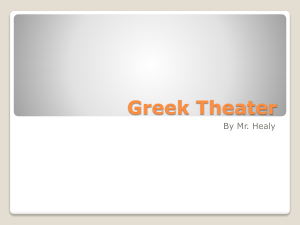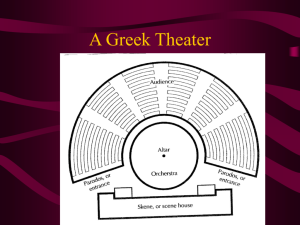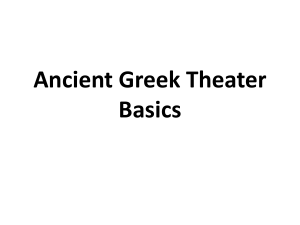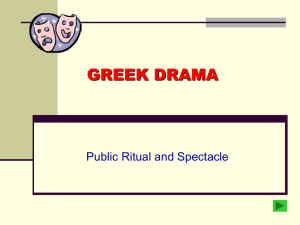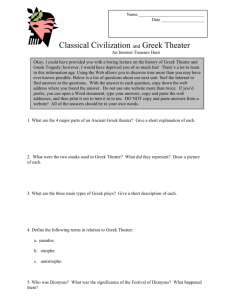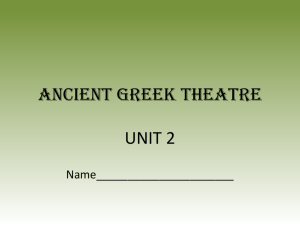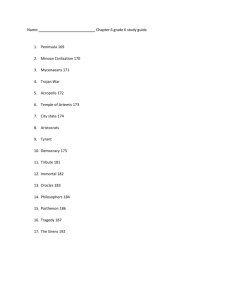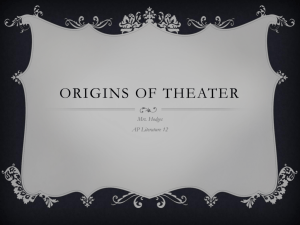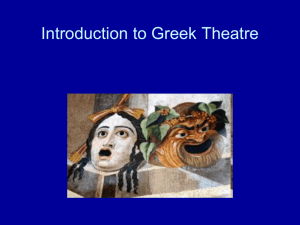document
advertisement
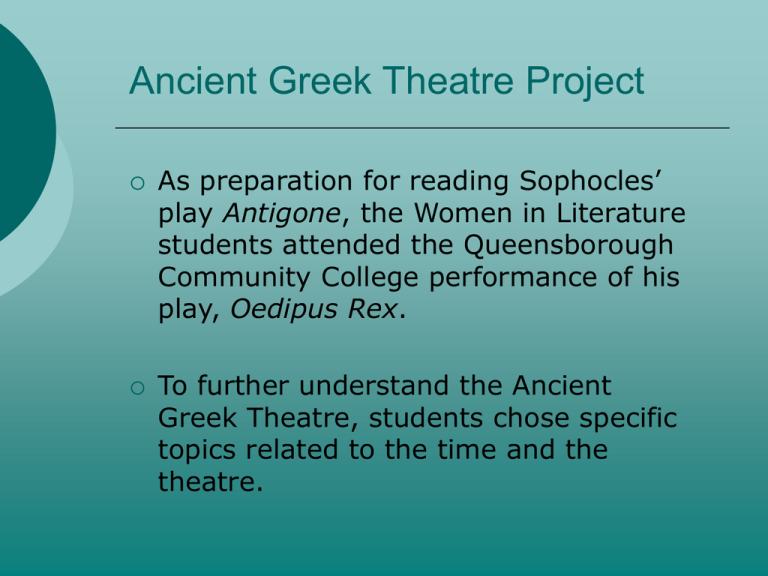
Ancient Greek Theatre Project As preparation for reading Sophocles’ play Antigone, the Women in Literature students attended the Queensborough Community College performance of his play, Oedipus Rex. To further understand the Ancient Greek Theatre, students chose specific topics related to the time and the theatre. Requirements Students followed the directions for the Project from the Hillcrest High School English Department web site. Students received instruction through the Internet and email. Students used APA documentation for their PowerPoint Presentations. Ancient Greek Theatre Project Presenting ELL2-02 Advance by using the arrow keys or left click the mouse. The removal of student names complies with the IAUP. Ancient Greek Theatre The origins of Greek Theatre Flourished in ancient Greece between c.600 and c. 200 BC Theatre started in the city state of Athens. Athenian tragedy, comedy, and satire were some of the earliest theatrical forms to emerge in the world. What drove Theatre to evolve were the political and military powers in Greece. With this Theatre got more topics and scenarios to act out. Athenian drama occurred at the Dionysia, an annual festival honoring Dionysus. Greek Theatre In some Greek plays men were selected to play both female and male roles. Like in this picture from the cast of dionysia there were only male cast members A Better view of Greek Theatre Greek Theatre buildings were called a Theatron. Panoramic view of the Greek theater at Epidaurus Symbols used in Greek Theatre These two masks are the symbols for theater. They represent the comedy and tragedy masks that were worn in ancient Greece - during the golden age, around 500 - 300 BC. They also represent duality. The theater of Dionysus, Athens (Saskia, Ltd.) References Buckham, Philip Wentworth. (n.d.). Greek theater. Rerieved May 14, 2006, from http://www.crystalinks .com/greektheater.html Englert, Walter. (n.d.) Greek theater for Hum110 Tech. http://academic.reed.edu/humanities/110Tech/ Theater.html// Greek Theater. (2006). Retrieved May 13, 2006, from http://images.google.com/imgres?imgurl=http:// historylink101.net/greek_images/greek-theater-10.jpg&imgrefurl=http://historylink101.net/greece1/ pic_greektheater.htm&h=216&w=324&sz=26&tbnid=Q3nsnWLvm1RVXM:&tbnh=76&tbnw=114&hl= en&start=6&prev=/images%3Fq%3Dgreek%2Btheater%26svnum%3D10%26hl%3Den%26lr%3D Dionysus Dionysus? Who Was He? Dionysus was the son of Zeus and Semele. • Dionysus was the Thracian god of wine. • Dionysus was also known as Bacchus in Greek and roman mythology. • Dionysus not only represented wine, but also the social influences of it. • Dionysus was seen as the promoter of civilization, a lawgiver, and a lover of peace. What Did He Do? Dionysus did many things for a god who represented wine. He rescued Ariadne after Theseus abandoned her. Dionysus also saved his mother from the underworld after his father showed her his true nature as the storm god. Dionysus was the god who gave Midas his golden touch and also was kind enough to take away this power when it was proven to be useless and problematic. CHILDHOOD Zeus put the rain nymphs of nysa in charge of raising Dionysus when he was a baby. Dionysus was also raised by Maro a priest of Apollo. While Dionysus was young, he disguised himself as a mortal on a ship. Sailors tried to kidnap Dionysus, but failed because he turned them into dolphins. In another similar story, Dionysus hired pirates to take him to Naxos from Icaria. The pirates instead took him to Asia planning on selling Dionysus as a slave. Dionysus turned the pirates into dolphins when he realized what was happening. References BBC – Religion & Ethics (7/22/2004). Dionysus. Retrieved May 17, 2006 from http://www.bbc.co.uk/ religion/religions/features/greek_gods/dionysus.shtml Dionysus. (n.d.) Retrieved May 15, 2006 from http://en.wikipedia.org/wiki/Dionysus#References Johnson, William A. (November 27, 2003). Euripides' Bacchae. Retrieved May 12, 2006 from http://classics.uc.edu/~johnson/tragedy/bacchae.html Skidmore, Joel. (1993). Greek Mythology. Retrieved May 22, 2006 from http://www.mythweb. com/gods/Dionysus.html Tau, Apiryon and Helena (1995). The Invisible Basilica: Dionysus. Retrieved May 15, 2006 from http://www.hermetic.com/sabazius/dionysus.htm Greek Theater Masks History of the Masks In Ancient Greek Theater Thespis was the first writer, in the Ancient Greek theater, who used masks. The members of the chorus wore masks, usually similar masks but completely different from the leading actors. The actors were all men, the mask was therefore necessary to let them play the female roles. History of the Masks In Ancient Greek Theater Historians claimed that the masks had one more significance by adding resonance to the voice of an actor so that everyone in the huge ancient theater could hear him. The masks would give the character some sort of universality, creating an average figure, so that the audience would judge him on his actions and not his appearance. Origin of Masks Mostly, the masks were made of linen, wood, or leather. A marble or stone face was used as a mould for the mask. Human or animal hair was also used. The eyes were fully drawn but in the place of the pupil of the eye was a small hole so that the actor could see. References Englert, Walter. (n.d.). Greek Theater Masks. Retrieved May 8, 2006, from http://academic.reed.edu/humanities/110Tech/Theater.html#Theaters Karayannakos, Elias . (n.d.). Greek Theater Masks. Retrieved May 10, 2006, from http://users.panafonet.gr/ekar/masks.html Masks of Ancient Greek Theater History • Masks were used in Greek Theater to show originality in their performances. • The first writer who used masks was Thespis. • The masks were made of linen wood or leather. Marble was also used to mold the masks. • Human and animal hair was used and the eyes were drawn to the size of the pupil so the actors were able to see. Masks of Tragedy and Comedy The two masks below represent the symbols of theater. The mask on the left represents comedy and the other on the right represents tragedy. Images References Buckham, Philip Wentworth. (1827). Theatre of the Greeks. Retrieved May 17, 2006, from www.reference.com/browse/wiki/Greek_theatre Davidson , J.A (1965). The Origins and Early Forms of Greek Tragedy. Retrieved May17,2006, from www.crystalinks.com/greektheater.html Haigh A.E, (1907). The Attic Theatre. Retrieved May 18, 2006, from www.reference.com/browse/wiki/Greek_theatre Lesky. (1965). A Greek Tragedy, Dithyramb, Tragedy, and Comedy). Retrieved May 18, 2006, from www.reference.com/ browse/wiki/Greek_theatre Ridgeway, William. (1910). Origin of Tragedy with the Greek Tragedians. Retrieved May 18, 2006, from www.reference.com/ Greek_theatre/References Riu, Xavier. (1999). Dionysism and Comedy. Retrieved May 18,2006, from www.crystalinks.com/greektheater.html Ancient Greek Drama Birth of Greek Drama About two thousands years before Shakespeare Greek Drama was born in Athens, Greece. Between the years of 600 to 200 B.C. Athenians made a type of culture where technique, form, and terminology was used and lasted approximately two millennia. They created plays that are considered to be some of the greatest works of art. The BIG Start ! Around 600 B.C. Greece was split into city-states. The most populated and famous city-state was Athens where more then 150,000 people lived. It was in Athens where the Rites of Dionysus evolved into theater. And Athens is the place where Greek Drama hits its golden era. Every Drama Needs Tragedy ! Between 600 and 500 B.C. the dithyramb had evolved into new forms, most notably the tragedy. Greek tragedy usually told a story that was indirectly used to teach religious lessons. Tragedies back then weren't plays with bad endings. Tragedy in the Greek drama was a form of ritual purification. Laugh Out Loud Tragedy was not what Greek drama only offered. Obviously, people would get bored with all tragedy. People back then also needed to laugh. There were comedies such as an orphan out of nowhere suddenly has many fathers to claim him. Greek Comedy The Warriors, in 'Lysistrata': First Speaker: For through man's heart there runs in flood A natural and noble taste for bloodSecond Speaker: To form a ring and fight— Third Speaker: To cut off heads at sight– All in Unison: It is our right! Youth... Come, listen now to the good old days when children, strange to tell, were seen not heard, led a simple life, in short were brought up well. References Gottfried Eggenhofer. (1999, January). Mask of comedy. Retrieved on May 11, 2006, from http://schulen.asn noe.ac.at/hskautzen/projekte/greece/theatre/theatre.htm Members of tripod. (2004, May). Ancient Greek Theater. Retrieved on May 9,2006, from http://anarchon.tripod.com/indexGREEKTH.html Spiros Tzelepis. (n.d.). Ancient theatre of Epidauros. Retrieved on 5/10/06, from http://users.otenet.gr/~tzelepisk/yc/art5.htm University of Victoria and the Social Sciences and Humanities Research Council of Canada. (n.d.) Greek Tragedy. Retrieved on 5/13/06. from http://ise.uvic.ca/Library/SLT/ drama/greektragedy.html CHORAL ODES In plays with tragedies, they have choral odes, this chorus would chant rhythmically. The chorus would walk back and forth across the stage chanting religious hymns. They are viewed as one, not individuals. The chorus was especially dominant. They have approximately 50 singing and dancing members. Tragedy came to be composed of episodes separated by choral odes. COMIC CHORUSES The functions of the comic chorus remain the same as those of the tragic chorus, to sing and dance choral odes and engage in dialogue with the actors. The comic chorus had 24 members compared with the 15 member tragic chorus. The comic chorus often had to impersonate non-human characters. THE CHORUS Offered background and summary information to help the audience follow the performance. Commented on main themes, and showed how an ideal audience might react to the drama as it was presented. Represented the general populace of any particular story. The chorus usually communicated in song form, but sometimes the message was spoken. GREEK CHORUS The chorus (choros) is believed to have grown out of the Greek dithyrambs (dĭth'ĭrăm), in ancient Greece, which is a hymn to the god Dionysus, a choral lyric with exchanges between the leader and the chorus. It arose, probably, in the extemporaneous songs of the Dionysiac festivals and was developed into the literary form to be found. In its later development by such poets as Philoxenus and Timotheus, it became freer in its meter and more musical. The tragedy seems to have come out of the dithyramb. The dithyramb was also cultivated after tragedy was invented. It was also believed to be grown out of the tragikon drama a company of actors who comment (by speaking or singing in unison) on the action in a classical Greek play. IMPORTANCE OF THE GREEK CHORUS The chorus provided time for scene changes and gave the principle actors a break. They offered important background and summary information that facilitates an audience's ability to follow the live performance. They also offered commentary about and underline main themes animating the action. They were also there to model an ideal audiences response to the unfolding drama. They also represent the general populace of any particular story. The chorus usually communicated in song form, but sometimes the message was spoken. It was the playwright's job to choreograph the chorus. GREEK CHORUSES REFERENCES Encarta.com (n.d.). Greek chorus Retrieved May 15, 2006, from http://encarta .msn.com 1997-2006 Microsoft Corporation. 1993-2006 Greek chorus. (May 8, 2006). Retrieved May 14, 2006, from http://en.wikipedia .org/wiki/Greek_chorus Intro. to Greek Tragedy. (n.d.). Greek chorus. Retrieved May 16, 2006, from http://ablemedia.com/ctcweb/netshots/tragedy.htm Tragic Basics. (n.d.). Greek chorus. Retrieved May 16, 2006, from http:// www.siu.edu/~dfll/classics/Johnson/Greeks/Lectures/Tragic%20basics.htm Ancient Greek Arts Festival Comedy Old Comedy ☺ In Ancient Greek theater there were many different types of comedy. ☺ The Greeks produced lasting comedy in two periods: Old Comedy represented by Cratinus and Aristophanes and New comedy whose exponents was Menander. ☺ They presented there work at the Athenian festivals. There were three actors, a chorus that sung, danced, and participated in the dialogue. ☺ Comedy seemed to have sprung into being at the vintage-festival of the Greek villagers, when all was jovial gaiety and jesting license in honor of Dionysus. ☺ “The common mood, whether joy or sorrow, is often communicated even to those who were originally possessed by the opposite feeling and so powerful is infection of excitement that a sober man will join in the antics of his drunken comrades--yielding to a drunkenness by induction.“ ☺ These seasons of contagious revelry were exactly suited to a development of the double desire of mankind for personation--one man seeking to get outside of his own individuality and to assume a character not his own, while another finds his satisfaction rather in the observation of this simulation, in being a sympathetic spectator when actions are represented not proper to the actor's own character. More Old Comedy ☺ These seasons of contagious revelry were exactly suited to a development of the double desire of mankind for personation--one man seeking to get outside of his own individuality and to assume a character not his own, while another finds his satisfaction rather in the observation of this simulation, in being a sympathetic spectator when actions are represented not proper to the actor's own character ☺ Comedy seemed to have sprung into being at the vintagefestival of the Greek villagers, when all was jovial gaiety and jesting license in honor of Dionysus. ☺ “The common mood, whether joy or sorrow, is often communicated even to those who were originally possessed by the opposite feeling and so powerful is infection of excitement that a sober man will join in the antics of his drunken comrades--yielding to a drunkenness by induction.“ New Comedy Comedy was aimed to common people that weren’t concerned with religious origins. Menander’s main contribution was to create a comedy model that influenced later comedy. New Comedy provided the model for European comedy through the 18th century. Classical comedy was brought up to date in the plays of the “Christian Terence,” imitations by schoolmasters of the comedies of the Roman dramatist. More New Comedy They added a contemporary flavor to the life portrayed and displayed a somewhat less indulgent attitude to youthful indiscretions than did the Roman comedy. New Comedy provided the basic conventions of plot and characterization for the comedy performed from written texts of 16th-century Italy, as in the plays of Machiavelli. Greek tragedies and comedies were always performed in outdoor theater were probably little more than open areas in city centers or next to hillsides where the audience, standing or sitting, where the people can listen to the singing. From the late 6th century BC to the 4th and 3rd centuries BC there was a gradual evolution towards more elaborate theater structures, but the basic layout of the Greek theater remained the same. References Image. (2005). Retrieved May 13, 2006, from www.ancientsculpturegallery.com/ 107.html Dunkle, Roger. (1986, March). Chorus. Retrieved May 12, 2006, from http://depthome.brooklyn .cuny.edu/classics/dunkle/studyguide/tragedy.htm Elias, Karayannakos. (2000, January). Masks. Retrieved May 12, 2006, from http://users.panafonet.gr/ekar/masks.html Trumbull, W. Eric Dr., Professor, Theatre/Speech. (February 21, 1998).Chorus. Retrieved May 12, 2006, from http://novaonline.nvcc.edu/eli/spd130et/ancientgreek.htm Sophocles A Greek Tragedian The Beginnings of Sophocles •Born in 496-405 B.C. in Colonus •Son of a wealthy merchant •Destined to be a famous and well known playwright of the golden age •Not only was Sophocles to be a playwright he was also known as a priest who introduced the cult of Asclepius to Athens •From a tender age he was known to be a graceful and kind person The Start of his Career • Sophocles enters the local playwright competition and brings home the first place prize. •More than writing his own plays, he sometimes acted in them as well. •Some of the plays he wrote and star in were… Plays by Sophocles • Nausicaa • The Women Washing Clothes • Electra • Oedipus at Colonus • The Women of Trachis • Antigone • Oedipus the King • Out of the many 120 plays that Sophocles wrote only a handful of them lasted • Shortly after the production of Oedipus at Colonus, he passed in 405 References LLC., Jalic (2003). Author Biographies. Retrieved May 12, 2006, from http://www.online-literature.com/sophocles Sophocles and his Tragedies. (2002) Retrieved May 12, 2006 from http://www. theatrehistory.com/ancient/bates022.html ELL2-02 Women in Literature English Elective 6th Period Instructor: Ms. L. Sirsky Uploaded June 6, 2006 Hillcrest High School English Department Ms. Sirsky, Webmaster
